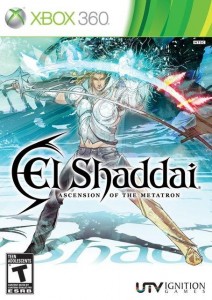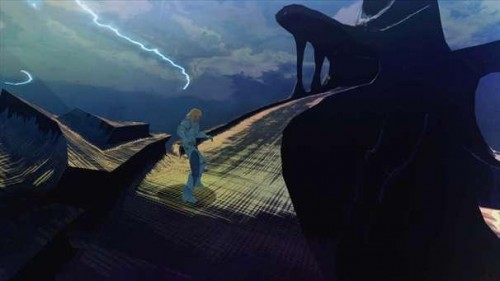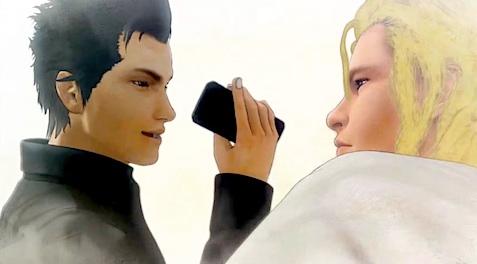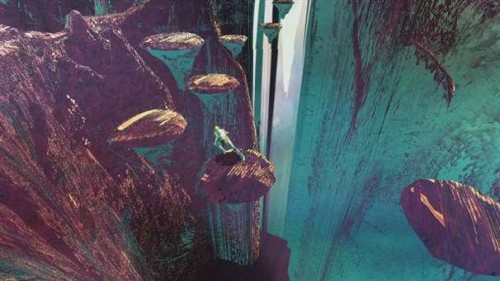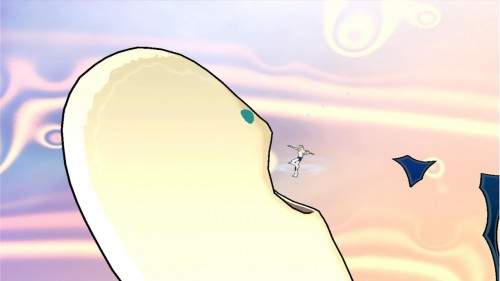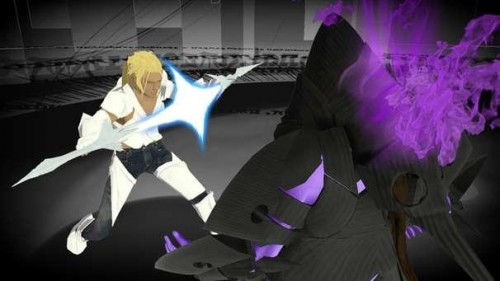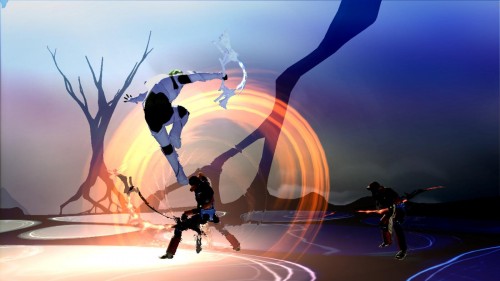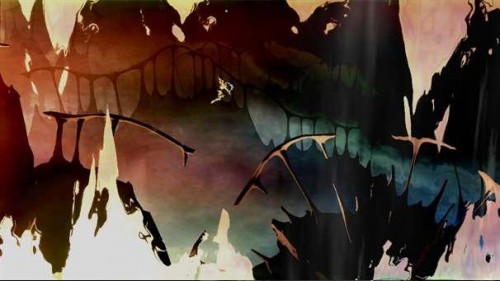Game Name: El Shaddai: Ascension of the Metatron
Platform(s): Xbox 360 (reviewed), Playstation 3
Publisher(s): UTV Ignition
Developer(s): UTV Ignition
Genre(s): Platformer/Action
Release Date: August 16, 2011 (US) September 9, 2011 (EU)
Price: $59.99
BUY NOW!
After a few delays and much anticipation, El Shaddai: Ascension of the Metatron has finally made it’s triumphant debut on consoles everywhere. For those not familiar with this title, El Shaddai was crafted from the ground up by an all-star development team lead by Takeyasu Sawaki, who is famous for his work on Devil May Cry and Okami. While gameplay is important, the most striking elements by far are the stunning environments that come alive while the player traverses a massive tower in order to prevent obliteration of the human race. So does this title have any substance under it’s dramatic visuals? Here is my review for El Shaddai: Ascension of the Metatron.
Story
El Shaddai: Ascension of the Metatron takes it’s narrative from The Book of Enoch, with several of the religious themes from the scriptures left intact. In this story however, the main player takes the role of Enoch himself and must “purify” seven fallen angels before God wipes out the world with a giant flood. To assist in this quest, a very cocky yet likable angel by the name of Lucifel acts as your guide and protector on this journey and will stop at nothing to see that these fallen deities receive judgement before the big man himself.
You might think a game based on a religious theme might be a bit boring or stale in some parts, but thankfully there is a lot to take in and I found it almost impossible to put away the controller due to the constantly unfolding plot. Oddly enough, Enoch was actually a bit bland as a character as we really didn’t get to know much about his background or personal motives, but I think the writers made up for this by surrounding this protagonist with allies and enemies that each were well portrayed and even had a bit of humor sprinkled in. Lucifel for instance steals every scene he graces the player with his presence in, as this sharply dressed angel is constantly delivering religious puns and spends a good portion of the game on his cell phone, chatting with the higher power. This guardian of sorts also serves an important purpose as anytime the player needs to save the game, they just need to head to these humorously out-of-place phone conversations.
El Shaddai’s story shines the brightest by keeping a cloak of mystery on whats ahead. Whether it was tracking down a fallen angel or following the mysterious little girl who has an odd attraction to Enoch, I always felt like there was an incentive to continue on (aside from the visuals, of course) and at times it can feel like you are watching a movie, where the build-up keeps you at the edge of your seat until the end. Sadly, the overall narrative starts to feel a bit rushed and stapled together about two-thirds of the way through, with an abrupt and disappointing finale that follows shortly after. Even though the story was rather campy at points, I felt completely invested in this tale and with all the massive presentation value and build-up throughout the game, more work should have been put in to make the finale end with a band instead of a mild spark.
Gameplay
While there is a lot to talk about when it comes to the combat in El Shaddai, this game is a platformer first and foremost. From the start, players take control of Enoch and must jump and fight their way through each stunning setting. Enoch thankfully is fantastic with his pouncing and is able to jump or double jump at the touch of a button with the player using the analog stick to control accuracy during the process. It may sound a bit silly to boast about jumping, but with the heavy amount of platforming throughout the game, it was a joy to see just how well Enoch pulled off the task.
To compliment these fluid controls, each level features a clever design that utilizes the platforming elements to near perfection. If human error is made and you fall to your doom, only a small amount of life is taken with Lucifel snapping his fingers and starting the player back right where they left off. To better show off Enoch’s platforming skills, certain areas can be accessed throughout the game that change the perspective to that of a 2D platformer. The controls work exactly the same in this view, but there are a few differences that in my opinion make this add-in the most memorable part of the whole experience due to the interaction with the environments. Some of these levels feature waves and balloons that can be hopped on and rode, while others just require some fast jumping skills to reach an exit. I don’t know if it’s the 2D platformer fan inside of me, but I got excited every time the game made it’s seamless transition to this perspective and surprisingly, these bits were lengthy at times as well.
When it comes to the actual fighting in El Shaddai, there are several mechanics in place that attempt to make the experience more than your typical hack and slash. Enoch gets three weapons at his disposal, with those being the Arch, which is used as a close-combat blade, the Gale that fires projectiles at a rapid pace, and a Veil which acts a pair of gauntlets or a shield. Out of the three, the only one I ever had trouble with was the Gale, as the darts it launched seemed to be inaccurate a good portion of the time. Now behind these three weapons are also added in abilities for equipping each. The Arch adds the power to hover for short distances, the Gale adds a dash attack, and the Veil comes equipped with a powerful ground punch. These abilities are rather minor however and don’t really serve much use other than the improved landing you get with the Arch.
The most interesting mechanics are found not the weapons themselves, but how they are actually used. You see, most enemies in the game possess the same trio of weapons you have and when you happen to knock one down, you can instantly steal their item as use it as your own. This method is more than just thievery though as a paper, rock, scissors weakness system applies to every enemy in the game. For instance, foes who hold the Arch are weak against the Gale but are more immune to the Veil, while foes who hold the Veil are weak against the Arch but strong against the Gale. This system requires you to constantly switch out weapons throughout the game and provides a fine layer of strategy to the whole fighting scheme. The only downside to this is that these three weapons are all Enoch gets and are obtained in the early chapters of the game, so after a while combat can feel a bit repetitive.
Another intriguing feature within was the way damage is taken by both the main protagonist and all foes within the game. Instead of a life bar, both Enoch and all of the enemies are equipped with armor. This armor will eventually chip away during battle, leaving an exposed character vulnerable to all incoming attacks. While it is an odd concept, it still fits right into the game’s bizarre nature and offers something original in the process.
Each floor of the tower you explore usually implements something new to keep the experience fresh. This constant revolving of various gameplay styles works for El Shaddai, but it is also somewhat of a curse at the same time. One stage might be purely based on platforming, while the next features a collection of environmental puzzles that must be completed to proceed. Another example that comes to mind is a stage where you take control of a motorcycle and have to speed through a city-lit stage while smashing enemies along the way. This bit was a blast to play, but it just felt too forced and unfitting compared to the rest of the levels within the game. That is the “curse” I was talking of though. Everytime I felt like I was starting to get into a groove with the current style of gameplay, the game would change up just for the sake of trying to add in something new to the player. Now I really respect the developers for adding in extra ingredients into the experience, but a lot of what was offered just didn’t fit with the narrative and didn’t flow properly with the other styles provided.
The main complaint by far I have with El Shaddai is how the latter portions of the game play out. During the first seven chapters, I honestly was feeling like this very well could have been one of the best titles to come out this year. After the eighth chapter though, things started to decline all over. Boss battles become a random, “here you go” type of occurrence that feel more like filler rather than a pivotal part of the storyline. As I mentioned, there are seven angels to defeat within the game, and each battle with the foes in the first half of the game feels truly epic and distinct to their own. Aside from one contender in the latter half, every other encounter plays out rather blandly and makes a couple of these bosses forgettable. This was really disappointing to myself as I felt like the game was preparing for an epic climax at the end, but the final results just didn’t live up to that potential. The road to the finale is also a rocky one, as it seemed many of the same enemy encounters and even platforming sections were repeated several times to lengthen the latter chapters.
If I didn’t love the plot so much near the end, I wouldn’t be upset about any of this. Sadly though, I was completely invested in what was going on and kept getting pulled out to complete tedious repeats. El Shaddai really doesn’t have many shortcomings in the actual gameplay mechanics, but this copy-paste level design that went on later in the game nearly overshadowed all of the fantastic innovation and beautiful visuals that El Shaddai so prominently displays.
Graphics
There are so many words that could be used to describe the visual experience one will get out of playing El Shaddai. Each environment is beautifully created and is literally alive with rich colors and textures flowing underneath your feet and in the backdrop itself. Not only are they fantastic to look at, but the sheer amount of variety makes progression feel like Christmas Morning, as there is always a whole new setting to explore and gawk at right around the corner. The 2D platforming levels keep this same aesthetic and even enhance upon it in parts, as this scenery is actually utilized into the gameplay and helps you progress throughout.
Character models are also a top-notch production all the way through as well, with each model literally flowing into the environments and making the graphical experience come full circle. When I started El Shaddai, I was looking for a map or a HUD right away as that is what one would expect for any title of the genre, but I can see why this was left out as it is obvious the developers wanted the player to explore every inch of this title to take in every sight. Now those who are wanting these tools can unlock them after completing the main game, but I honestly couldn’t imagine anything extra on the screen that might take away the “living painting” look to the game. It is a very rare occurrence when you actually stop and appreciate the world you are exploring, but El Shaddai’s groundbreaking visuals literally demand attention throughout each stage.
Audio
Another element that is just as important in El Shaddai: Ascension of the Metatron is the soundtrack. Tunes within vary just as much as the environments do, so players are treated to a fitting track for each level that makes this fully animated world come alive. The voice acting is good for most of the characters, but I must give it to Jason Isaacs who played the role of Lucifel, as he did a superb job in bringing out the full personality of his character. At times I did notice that some bosses repeated the same line over and over, but this is easy to overlook for the most part and really isn’t as annoying as one would think. Little sound effects like gusts of wind, small footsteps, and rain showers also go a long way to create quite an atmosphere for the game, so if anyone is planning on playing this title on mute, you may be only getting a fraction of whole treatment.
Overall
If I were to base the score for this game on visuals and the soundtrack alone, it would surely be a flawless victory for El Shaddai. Sadly though, the final chapters feel rushed and misplaced and the finale was too abrupt to deliver that ultimate payoff that the game built itself up for. There are some very original ideas that are all executed wonderfully in this title, but some were just too ambitious to actually fit in with the angelic plot given and felt forced as a result. That being said, this is definitely a game that pushes the limits and at least attempts to pull in the player with it’s bizarre yet engrossing plot. No matter what the verdict, there is no doubt that years from now, El Shaddai will still be talked about for having some of the most stunning settings in videogame history, which is something that Takeyasu Sawaki and his team should definitely be proud of.
I Give El Shaddai: Ascension of the Metatron:



